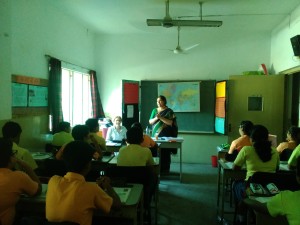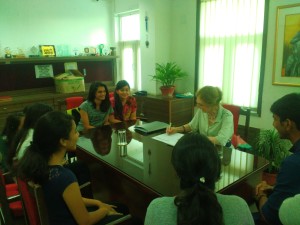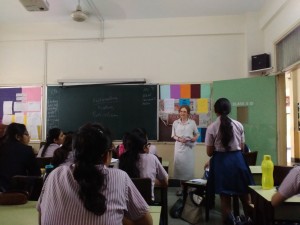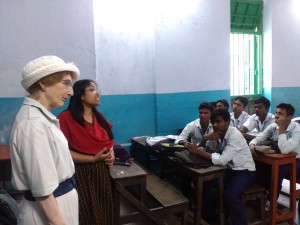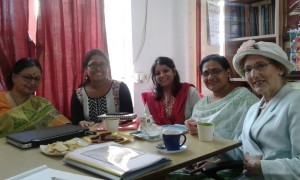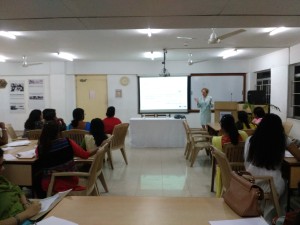PeaceWorks hosted Ineke Veldhuis-Meester, Euroclio Ambassador and former Professor, Groningen University from 6 November to 13 November as part of a study visit which included the International Conference on Teaching History from 10 – 12 November 2016. Prior to the conference she was able to visit four very diverse schools and interact with teachers and students. She was also able to meet with educators from the rest of the subcontinent during the conference.
7 November 2016, visit to Akshar and Calcutta International School.
Akshar is the first inclusive school in Calcutta. It was started in the late 90s by the Rajpal Khullar Trust after a felt need to establish an institute that benefits children with borderline special needs. As a rule, the school admits five special needs students on an average per class. While there are teachers trained in special education to give individualised care to the students who need it, each class also has teachers who sit with special needs students, helping them out wherever they require during a regular class. The school offers the Indian Certificate for Secondary Education (ICSE) board for the mainstream classes, and the Open Basic Education (OBE) and the National Institute of Open Schooling (NIOS) curricula for those with special needs.
Ineke was able to experience history class with Grade eight and with Grade seven. The class in Grade seven gave Ineke an example of how an integrated classroom functions. Ineke was also shown around the school and introduced to educators—both special educators as well as those teaching the regular classes. She spoke with some students in each of the classrooms, most saying that they like history because they can learn about the past and also because their teacher is entertaining!
Calcutta International School is the first school in the city to offer the GCSE syllabus. It caters to a large cross section of students from Calcutta as well as children of expatriates. Founded in 1953, it is now a school with pupils of 17 nationalities. Ineke was shown around the school by Ms Tina Servaia, a history teacher in the middle and senior school and also member of the Advisory Board of History for Peace.
Ineke was then able to interact with eight students who have taken up humanities and history in high school. Most of them shared with her their experiences of studying in a school that has a different curriculum and different teaching methodology than most other schools in the rest of the country. They spoke about the fact that the curriculum itself offers a lot of freedom in terms of the analysis and interpretation of texts. The students enjoy their history classes particularly because of the freedom given to them to discuss, analyse and debate. Ineke then spoke with a group of senior teachers, discussing the methods that they use for teaching and the difference in the curriculum with other boards.
After lunch at the Seagull Publishing Office, Ineke visited an old Bengali house in North Calcutta and was able to get a taste of the kind of traditions and lifestyles that people followed and led in India in the past as well as now.
8 November 2016, visit to Modern High School for Girls and Kailash Vidyamandir.
Modern High School was founded by Mrs BM Birla in 1952. Mrs Birla came from a leading industrialist family and the school at that time set a revolutionary example in the area of women’s education. The school offers the Indian Certificate for Secondary Education curriculum for their students.
Ineke met with Ms Devi Kar, the Director (and former Principal), Ms Damayanti Mukherjee, Principal and Ms Amita Prasad, the Vice- Principal. Ms Kar spoke to Ineke in detail about the ethos of the school. Ineke was able to attend a class by Ms Sunita Biswas, who was teaching a class on Gandhi for Grade 10 and a class by Ms Sutapa Roy who was teaching a class on American History for Grade 12.
Ms Biswas used a video clip of Gandhi being interviewed by a journalist as well as an audio clip of a narration of a poem by Tagore. Both these teaching tools fed effectively into a discussion on Nationalism vis a vis Patriotism. The students in Grade 12 spoke on what they think bias in history textbooks entails. One of them mentioned how the 1971 war is represented differently in textbooks in the subcontinent.
Kailash Vidyamandir is a Government school setup under the Sarva Shiksha Abhiyan scheme. This school caters to both day scholars as well as boarders from low-income families from the state and offers the Madhyamik curriculum for the students. The school is solely for boys up to Grade 10 and becomes co-educational in Grades 11 and 12. Ineke met students in Grade 8 and was able to look at a textbook used for History. She also spoke with students in Grade 11. Many of the students in Grade 11 said that they took up History as a subject only because it was easy to score higher marks in the subject!
9 November 2016, visit to Vikramshila, a non-profit organisation that functions as an education resource society and a workshop for teachers at the Modern Academy of Continuing Education (MACE).
Ms Subhra Chatterji, Director of Vikramshila, introduced Ineke to the methods of education that they use in their centres.
Over the one and a half-hour long conversation the main points that emerged were:
- Students attend regular schools in the day and come to the centres, spread across the city for after school learning programmes.
- The organisation engages in many interesting activities, which encourage team work and develop critical thinking and research skills.
- One of their most interesting projects till date was to document oral histories from within their communities and families These were then turned into theatre performances.
- The social sciences are focussed upon and learning is centered around practical hands on pedagogy such as making charts, mapping ideas and community based project work. These methods develop creativity, critical thinking skills and enhance confidence and communicating abilities.
One of Vikramshila’s biggest success stories is that some of the students come back to the project as teachers, thereby bringing an in depth understanding to the needs of the children.
‘ History Education- A mirror of pride and pain?‘- Workshop at Modern Academy of Continuing Education.
Ineke began with a presentation on what history means to different people and how as history teachers it becomes important to take the different perceptions into account. Some of the participants spoke about biased perceptions of history in the subcontinent. What was interesting was that both students (senior school students from Modern High School) and teachers had very similar points to make regarding bias and how textbooks reflect the inherent bias of the author of the textbook and the politics of the nation at the time of writing the book.
Participants were grouped into 5 groups of 4-5 each for the activity, which was an exercise on how different perceptions can be—even among teachers. The teachers were asked to, first individually think of events that shaped the country. The process was then repeated, in pairs and then a larger group. The participants had to work as a group to reach a consensus, as the number of events allowed per group was limited. Interestingly, the activity started off with many participants agreeing with each other, but as the groups became larger it apparently became harder to agree! At the end of the time allotted, the participants presented their work, having made points on charts. Some of the common events chosen included partition and the Swadeshi movement. One of the groups mentioned ‘the emergence of a national identity’ in relation to the struggle for Independence.
– Paroma Sengupta and Subhadrika Sen

